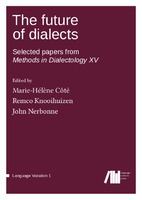The future of dialects: Selected papers from Methods in Dialectology XV
Author(s)
Côté, Marie-Hélène
Knooihuizen, Remco
Nerbonne, John
Language
EnglishAbstract
Traditional dialects have been encroached upon by the increasing mobility of their speakers and by the onslaught of national languages in education and mass media. Typically, older dialects are “leveling” to become more like national languages. This is regrettable when the last articulate traces of a culture are lost, but it also promotes a complex dynamics of interaction as speakers shift from dialect to standard and to intermediate compromises between the two in their forms of speech. Varieties of speech thus live on in modern communities, where they still function to mark provenance, but increasingly cultural and social provenance as opposed to pure geography. They arise at times from the need to function throughout the different groups in society, but they also may have roots in immigrants’ speech, and just as certainly from the ineluctable dynamics of groups wishing to express their identity to themselves and to the world.
Keywords
dialectology; dialects; Isogloss; Standard language; SyntaxDOI
10.26530/OAPEN_603313ISBN
9783946234197;9783946234203OCN
945783724Publisher
Language Science PressPublisher website
https://langsci-press.org/Publication date and place
2016Series
Language Variation, 1Classification
Linguistics


 Download
Download Web Shop
Web Shop